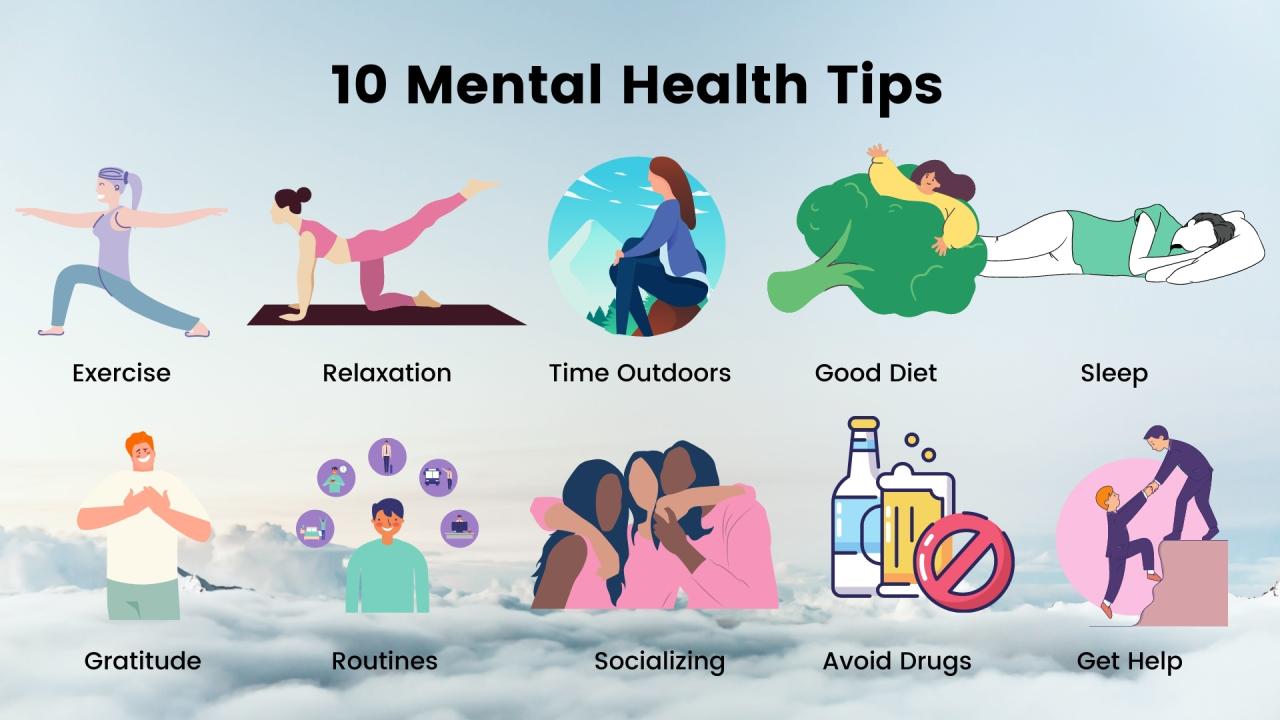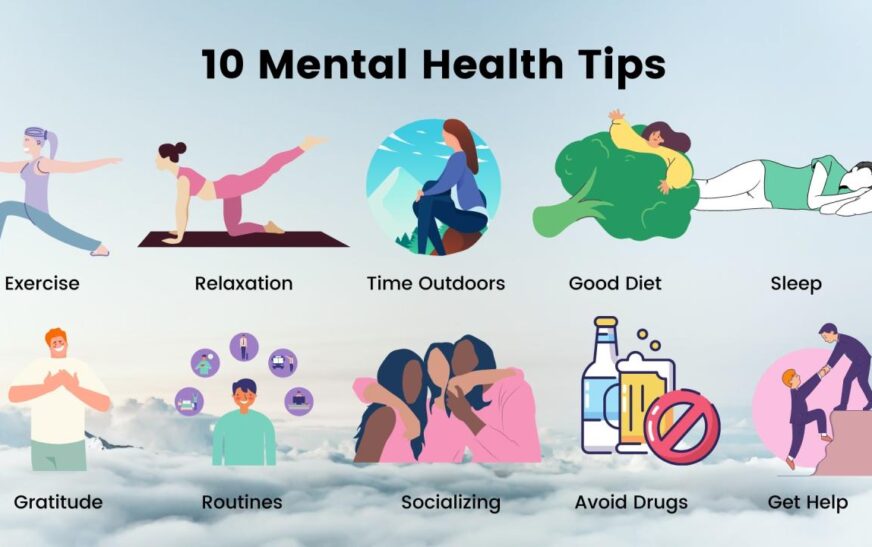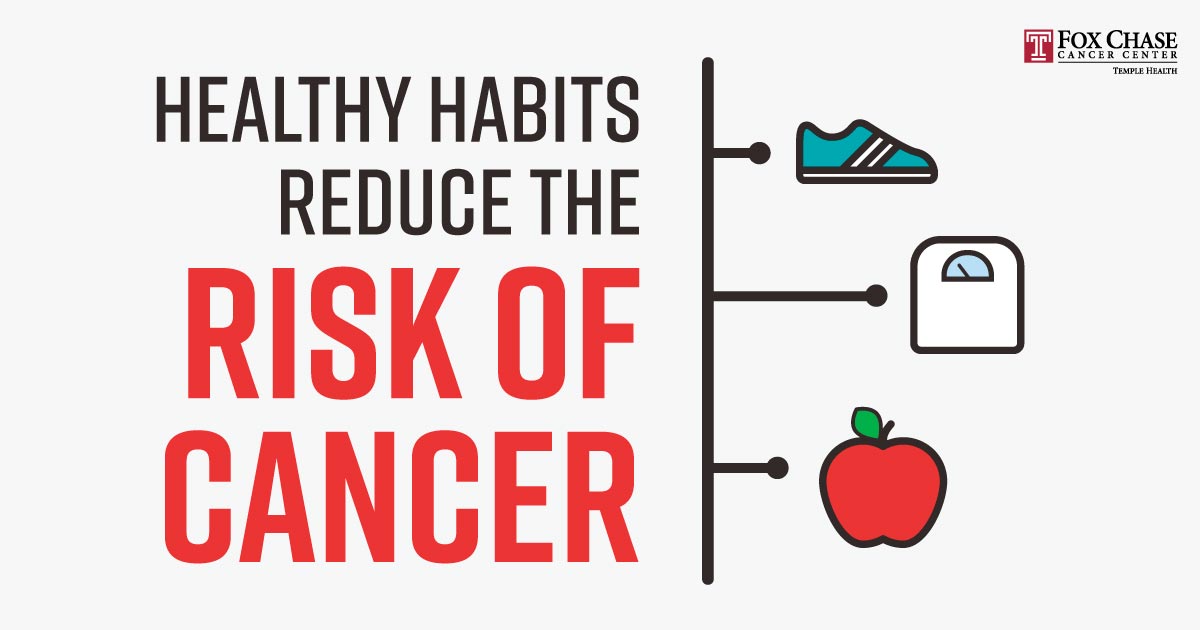Kicking off with Improve Mental Health Daily, this opening paragraph is designed to captivate and engage the readers, setting the tone deep and engaging interview style that unfolds with each word.
In today’s fast-paced world, prioritizing mental health is crucial for overall well-being. From simple daily habits to the impact of nutrition, social connections, and stress management techniques, this comprehensive guide explores various ways to enhance mental health on a daily basis.
Ways to Improve Mental Health Daily
Improving mental health is essential for overall well-being. There are simple daily habits that can contribute to better mental health, such as maintaining a routine, getting enough sleep, eating a balanced diet, staying hydrated, and connecting with others.
Importance of Physical Exercise
Physical exercise plays a crucial role in maintaining good mental health. Exercise releases endorphins, which are known as “feel-good” hormones that can help reduce feelings of stress, anxiety, and depression. It also improves sleep, boosts self-esteem, and enhances cognitive function.
Mindfulness Practices
Incorporating mindfulness practices into daily routines can also improve mental health. Mindfulness involves being present in the moment, without judgment. Examples of mindfulness practices include meditation, deep breathing exercises, yoga, and mindful eating. These practices can help reduce stress, improve focus, and promote emotional regulation.
Nutrition and Mental Health

Nutrition plays a crucial role in mental health, as the food we consume directly impacts our mood, cognitive function, and overall well-being. Certain nutrients can either support or hinder brain function, affecting our mental clarity, focus, and emotional stability.
Impact of Nutrition on Mental Health
Nutrients like omega-3 fatty acids, vitamins B6 and B12, folate, and minerals like zinc and magnesium are essential for brain health. Deficiencies in these nutrients have been linked to mental health disorders such as depression, anxiety, and even cognitive decline. On the other hand, consuming a diet rich in whole foods, fruits, vegetables, lean proteins, and healthy fats can support optimal brain function and mental well-being.
Foods that Affect Mood and Cognitive Function, Improve Mental Health Daily
Certain foods can have a direct impact on our mood and cognitive function. For example, foods high in sugar and processed fats can lead to fluctuations in blood sugar levels, causing mood swings and decreased focus. On the other hand, foods rich in antioxidants, like berries and leafy greens, can help reduce inflammation in the brain and support cognitive function.
Foods Beneficial for Mental Well-being
- Fatty Fish: Rich in omega-3 fatty acids, essential for brain health and mood regulation.
- Nuts and Seeds: Good sources of magnesium and zinc, important for cognitive function and mood stability.
- Leafy Greens: Packed with antioxidants and folate, which support brain health and reduce inflammation.
- Berries: High in antioxidants and vitamin C, beneficial for overall brain function and mood enhancement.
- Whole Grains: Provide a steady source of energy for the brain and contain B vitamins essential for mental health.
Social Connections and Mental Health: Improve Mental Health Daily
Social connections play a crucial role in our mental health and well-being. Building and maintaining healthy relationships can have a positive impact on our overall mental health. In contrast, lack of social connections or unhealthy relationships can lead to feelings of loneliness, isolation, and even contribute to mental health issues such as depression and anxiety.
Nurturing Healthy Relationships
- Regular communication: Keep in touch with friends and loved ones through calls, texts, or social media to maintain a sense of connection.
- Quality time: Spend meaningful time together, engage in activities that you both enjoy, and create lasting memories.
- Empathy and support: Show empathy, listen actively, and offer support when needed to strengthen your relationships.
- Healthy boundaries: Respect each other’s boundaries, communicate openly, and address any issues that may arise in a constructive manner.
Importance of Setting Boundaries
Setting boundaries in social interactions is essential for maintaining our mental health and well-being. It helps us establish limits on what we are willing to accept in a relationship, communicate our needs effectively, and protect our emotional and mental space.
- Self-care: Setting boundaries allows us to prioritize self-care and avoid overextending ourselves in social situations.
- Respect: Boundaries help cultivate respect in relationships by clearly defining what is acceptable and unacceptable behavior.
- Healthy relationships: Establishing boundaries fosters healthy relationships built on mutual respect, understanding, and support.
- Emotional well-being: By setting boundaries, we can protect our emotional well-being and prevent feelings of resentment or burnout.
Stress Management Techniques
Managing stress effectively is crucial for maintaining good mental health. There are various strategies and techniques that can help individuals cope with stress in their daily lives. Here, we will explore some effective stress management techniques, relaxation methods, and the importance of hobbies in reducing stress levels.
Strategies for Managing Stress
- Practice mindfulness: Mindfulness techniques, such as deep breathing exercises and meditation, can help individuals stay present and reduce stress levels.
- Exercise regularly: Physical activity releases endorphins, which are known as “feel-good” hormones that can help alleviate stress and improve mood.
- Establish a routine: Creating a structured daily routine can provide a sense of stability and control, reducing feelings of overwhelm and stress.
- Set boundaries: Learn to say no to tasks or commitments that may be causing excessive stress and prioritize self-care.
Relaxation Techniques for Stress Relief
- Progressive muscle relaxation: This technique involves tensing and relaxing different muscle groups in the body to promote physical relaxation.
- Guided imagery: Visualizing peaceful and calming scenes can help shift focus away from stressors and induce a state of relaxation.
- Deep breathing exercises: Practicing deep breathing techniques can help calm the mind and body, reducing stress and anxiety levels.
Role of Hobbies and Leisure Activities in Stress Reduction
Engaging in hobbies and leisure activities is not only enjoyable but also essential for reducing stress and improving mental health. Hobbies provide a creative outlet and a way to unwind, allowing individuals to take a break from the demands of daily life. Whether it’s painting, gardening, playing music, or practicing yoga, hobbies can help individuals relax, recharge, and cope with stress more effectively.
Ultimate Conclusion
In conclusion, nurturing your mental health daily is a journey that involves incorporating positive habits, maintaining a balanced diet, fostering meaningful relationships, and effectively managing stress. By implementing these strategies, you can take proactive steps towards improving your mental well-being and leading a more fulfilling life.
FAQ Guide
How important are daily habits in improving mental health?
Daily habits play a significant role in mental health as they contribute to establishing a routine, promoting self-care, and reducing stress levels.
Why is nutrition essential for mental well-being?
Nutrition impacts mood and cognitive function, making it crucial for maintaining good mental health. Certain foods can boost brain health and overall well-being.
What role do social connections play in mental health?
Social connections are vital for mental health as they provide support, reduce feelings of isolation, and enhance overall happiness and well-being.
How can stress management techniques benefit mental health?
Effective stress management techniques help reduce anxiety, improve resilience, and promote better emotional well-being.







